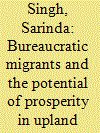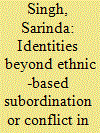| Srl | Item |
| 1 |
ID:
108968


|
|
|
|
|
| Publication |
2011.
|
| Summary/Abstract |
This paper argues that Lao bureaucrats who migrate to the uplands offer possibilities for re-thinking the immutability of upland-lowland distinctions and the power of the modern state. The specific focus is on low-ranking government officials on the Nakai Plateau in central Laos who are positioned at the nexus of state authority, development schemes and the rural poor. Nakai is a site of nationally significant resource utilisation and practices that has provided a model for development across the country. Officials' experiences in Nakai suggest that the upland-lowland contrast can provide valuable understandings of power when combined with an awareness of social processes that reproduce and shift the meanings ascribed to these nominally distinct domains. Significantly, the experiences of mobile marginal officials highlight an idea of state power as the potential to grant prosperity.
|
|
|
|
|
|
|
|
|
|
|
|
|
|
|
|
| 2 |
ID:
151475


|
|
|
|
|
| Summary/Abstract |
This paper explores everyday expressions of identity by Lao villagers living in northeast Cambodia near the border with Laos, and uses this to reflect on trends in studies of identity in the remote borderlands of Southeast Asia. I argue that while ethnicity is certainly crucial, discipline-specific emphases – ethnic-based subordination or conflict for social studies and political studies, respectively – result in less attention to other important dynamics shaping identity. Furthermore, I suggest that low-profile case studies not strongly linked to ethnic-based subordination or conflict – such as the Lao in Cambodia – require study for a more comprehensive view of identity in the borderlands. The case study from northeast Cambodia identifies four key dynamics shaping identity: inter-state relations, ethno-national identities, cross-border livelihoods and social status. I show how minimal inter-state tensions and varied personal connections to Laos were important in facilitating villagers’ involvement in lucrative illegal cross-border logging in Laos, but the latter were never used to justify this practice. Instead in this everyday setting, villagers emphasised their sense of marginalisation within Cambodia and thus demonstrate their regular prioritisation of status.
|
|
|
|
|
|
|
|
|
|
|
|
|
|
|
|